- Home
- Patricia Cornwell
Cruel & Unusual Page 15
Cruel & Unusual Read online
Page 15
She surprised me by answering the phone, and sounded reluctant and tense when I asked if I could drop by.
“Jason's out,” she said, as if that mattered somehow. “He went to the mall.”
“Well, I have a few things for you,” I explained.
“What things?”
“Christmas things. I'm supposed to go to a party, so I won't stay long. Is that all right?”
“I guess. I mean, that's nice.”
I had forgotten she lived in Southside, where I rarely went and was inclined to get lost. Traffic was worse than I had feared, the Midlothian Turnpike choked with last minute shoppers prepared to run you off the road as they ran their Happy Holidays errands. Parking lots swarmed with cars, stores and malls so garishly lit up it was enough to make you blind. Susan's neighborhood was very dark and twice I had to pull over and turn on the interior light to read her directions. After much riding around, I finally found her tiny ranch-style house sandwiched between two others that looked exactly like it.
“Hi,” I said, peering at her through leaves of the pink poinsettia in my arms.
She nervously locked the door and showed me to the living room. Pushing books and magazines aside, she set the poinsettia on the coffee table.
“How are you feeling?”
I asked.
“Better. Would you like something to drink? Here, let me take your coat.”
“Thanks. Nothing to drink. I can't stay but a minute.”
I handed her a package. “A little something I picked up when I was in San Francisco last summer.”
I sat on the couch.
“Wow. You really do your shopping early.”
She avoided my eyes as she curled up in a wing chair. “You want me to open it now?'
“Whatever you'd like.”
She carefully sliced through tape with a thumbnail and slipped off the satin ribbon intact. Smoothing the paper into a neat rectangle, as if she planned to reuse it, she placed it in her lap and opened the black box.
“Oh,” she said under her breath, unfolding the red silk scarf.
“I thought it would look good with your black coat,” I said. “I don't know about you, but I don't like wool against my skin.”
“This is beautiful. It's really thoughtful of you, Dr. Scarpetta. I've never had anybody bring me something from San Francisco before.”
The expression of her face pricked my heart, and suddenly my surroundings came into sharper focus. Susan was wearing a yellow terry cloth robe, frayed at the cuffs, and a pair of black socks that I suspected belonged to her husband. Furniture was scarred and cheap, upholstery shiny. The artificial Christmas tree near the small TV was scanty decorated and missing several limbs. There were few presents underneath. Propped against a wall was a folded crib that was dearly secondhand.
Susan caught me glancing around and looked ill at ease.
“Everything is so immaculate,” I said.
“You know how I am. Obsessive-compulsive.”
“Thankfully. If a morgue can look terrific, ours does.”
She carefully folded the scarf and returned it to its box. Pulling her robe more tightly around her, she stared silently at the poinsettia.
“Susan,” I said gently, “do you want to talk about what's going on?”
She did not look at me.
“It's not like you to get upset as you did the other morning. It's not like you to miss work and then quit without so much as calling me.”
She took a deep breath. “I'm really sorry. I just can't seem to handle things too well these days. I really react. Like when I was reminded of Judy.”
“I know your sister's death must have been terrible for you.”
“We were twins. Not identical. Judy was a lot prettier than me. That was part of the problem. Doreen was jealous of her.”
I liked Susan and I felt hurt and deeply troubled. She was not being honest with me.
“Is there anything else you'd like to tell me about?”
I asked, my eyes not leaving her.
She glanced at me and I saw fear. “I can't think of anything.”
I heard a car door shut.
“Jason's home,” she barely said.
Our conversation had ended, and as I got up I said quietly to her, “Please contact me if you need anything, Susan. A reference, or just to talk. You know where I am.”
I spoke to her husband only briefly on my way out. He was tall and well built, with curly brown hair and distant eyes. Though he was polite, I could tell he was not pleased to discover me in his house. As I drove across the river, I was shaken by the image that this struggling young couple must have of me. I was the boss dressed in a designer suit arriving in her Mercedes to deliver token gifts on Christmas Eve. The alienation of Susan's loyalty touched my deepest insecurities. I was no longer sure of my relationships or how I was perceived. I feared I had faked some test after Mark was killed, as if my reaction to that loss held the answer to a question in the lives of those around me. After all, I was supposed to handle death better than anyone. Dr. Kay Scarpetta, the expert. Instead, I had withdrawn, and I knew others felt the coolness around my edges no matter how friendly or thoughtful I tried to be. My staff no longer confided in me. Now it appeared security in my office had been violated, and Susan had quit.
Taking the Cary Street exit; I turned left into my neighborhood and headed for the home of Bruce Carter, a district court judge. He lived on Sulgrave, several blocks from me, and suddenly I was a child in Miami again, staring at what had seemed mansions to me then. I remembered going door-to-door with a wagon full of citrus fruit, knowing that the elegant hands doling out change belonged to unreachable people who felt pity. I remembered returning home with a pocket full of pennies and smelling the sickness in the bedroom where my father lay dying.
Windsor Farms was quietly rich, with Georgian and Tudor houses neatly arranged along streets with English names, and estates shadowed by trees and surrounded by serpentine brick walls. Private security jealously guarded the privileged, for whom burglar alarms were as common as sprinklers. Unspoken covenants were more intimidating than those in print. You did not offend your neighbors by putting up clotheslines or dropping by unannounced. You did not have to drive a Jaguar, but if your means of transportation was a rusting pickup truck or a morgue wagon, you kept it out of sight inside the garage.
At quarter past seven, I parked behind a long line of cars in front of a white-painted brick house with a slate roof. White lights were caught like tiny stars in boxwoods and spruces, and a fragrant fresh wreath hung on the red front door. Nancy Carter embraced my arrival with a gorgeous smile and arms extended to take my coat. She talked nonstop above the indecipherable language of crowds as light winked off the sequins of her long red gown. The judge's wife was a woman in her fifties refined by money into a work of well-bred art. In her youth, I suspected, she had not been pretty.
“Bruce is somewhere .. .”
She glanced about. “The bar's over there.”
She directed me to the living room, where the bright holiday attire of guests blended wonderfully with a large vibrant Persian rug that I suspected cost more than the house I had just visited on the other side of the river. I spotted the judge talking to a man I did not know. I scanned faces, recognizing several physicians and attorneys, a lobbyist, and the governor's chief of staff. Somehow I ended up with a Scotch and soda, and a man I had never seen before was touching my arm.
“Dr. Scarpetta? Frank Donahue,” he introduced himself loudly. “A Merry Christmas to you.”
“And to you,” I said.
The warden, who allegedly had been ill the day Marino and I had toured the penitentiary, was small, with coarse features and thick graying hair. He was dressed like a parody of an English toastmaster in bright red tails, a ruffled white dress shirt, and a red bow tie twinkling with tiny electric lights. A glass of straight whiskey tilted perilously one hand as he offered me the other.
He leaned close to
my ear. “I was disappointed I was unable to show you around the day you came to the pen.”
“One of your officers took good care of us. Thank you.”
“I guess that would have been Roberts.”
“I think that was his name.”
“Well, it's unfortunate that you had to go to the trouble.”
His eyes roamed the room and he winked at someone behind me. “A lot of horse crap was what it was. You know, Waddell'd had a couple of nosebleeds in the past, and high blood pressure. Was always complaining about something. Headaches. Insomnia.”
I bent my head, straining to hear.
“These guys on death row are consummate con artists. And to be honest, Waddell was one of me worst” “I wouldn't know,” I said, looking up at him.
“That's the trouble, nobody knows. No matter what you say, nobody knows except those of us who are around these guys every day.”
“I'm sure.”
“Waddell's so-called reformation, him turning into such a sweetheart. Sometime let me tell you about that, Dr. Scarpetta, about the way he used to brag to other inmates about what he did to that poor Naismith girl. Thought he was a real cock of the walk because he did a celebrity.”
The room was airless and too warm. I could feel his eyes crawl over my body.
“Of course, I don't guess much surprises you, either,” he said.
“No, Mr. Donahue. There isn’t much that surprises me.”
“To be honest, I don't know how you look at what you do every day. Especially this time of year, people killing each other and themselves, like that poor lady who committed suicide in her garage the other night after opening her Christmas presents early.”
His remark caught me like an elbow in the ribs. There had been a brief story in the morning paper about Jennifer's Deighton's death, and a police source had been quoted as saying that it appeared she had opened her Christmas presents early. This might imply she had committed suicide, but there had been no statement to that effect.
“Which lady are you referring to?”
I asked.
“Don't recall the name.”
Donahue sipped his drink, his face flushed, eyes bright and constantly moving. “Sad, real sad. Well, you'll have to visit us at our new digs in Greensville one of these days.”
He smiled broadly, then left me for a bosomy matron in black. He kissed her on the mouth and both of them started laughing.
I went home at the earliest opportunity, to find a fire blazing and my niece stretched out on the couch, reading. I noted several new presents under the tree.
“How was it?” she asked with a yawn.
“You were wise to stay home,” I said. “Has Marino called?”
“Nope.”
I tried him again, and after four rings he answered irritably.
“I hope I didn't get you too late,” I apologized.
“I hope not, either. What's wrong now?”
“A lot of things are wrong. I met your friend Mr. Donahue at a party this evening.”
“What a thrill.”
“I wasn't impressed, and maybe I'm just paranoid, but I thought it odd he brought up Jennifer Deighton's death.”
Silence.
“The other little twist,” I went on, “is it appears Jennifer Deighton faxed a note to Nicholas Grueman less than two days before her murder. In it she sounded upset, and I got the impression he wanted to meet with her. She suggested he come to Richmond.”
Still Marino said nothing.
“Are you there?” I asked.
“I'm thinking”
“Glad to hear it. But maybe we should think together. Sure I can't change your mind about dinner tomorrow?”
He took a deep breath. “I'd like to, Doc. But I.. “ A female voice in the background said, “Which drawer's it in?”
Marino evidently placed his hand over the receiver and mumbled something. When he got back to me he cleared his throat.
“I'm sorry,” I said . “I didn't know you had company.”
“Yeah.”
He paused.
“I would be delighted if you and your friend would come to dinner tomorrow,” I offered.
“The Sheraton's got this buffet. We was going to go to that.”
“Well, there's something for you under the tree. If you change your mind, give me a call in the morning.”
“I don't believe it. You broke down and got a tree? Bet it's an ugly little sucker.”
“The envy of the neighborhood, thank you very much,” I said.”
Wish your friend a Merry Christmas for me.”
7
I woke up the next morning to church bells chiming and draperies glowing with the sun. Though I'd had very little to drink the night before, I felt hung over. Lingering in bed, I fell back to sleep and saw Mark in my dreams.
When I finally got up, the kitchen was fragrant with vanilla and oranges. Lucy was grinding coffee beans.
“You're going to spoil me, and then what will I do? Merry Christmas.”
I kissed the top of her head, noticing an unusual bag of cereal on the counter. “What's this?”
“Cheshire muesli. A special treat. I brought my own supply. It's best with plain yogurt if you've got it, which you don't. So we'll have to settle for skim milk and bananas. Plus, we have fresh orange juice and decaffeinated French vanilla coffee. I guess we should call Mom and Grans.”
While I dialed my mother's number from the kitchen, Lucy went into my study to use that extension. My sister was already at my mother's, and soon the four of us were on the line, my mother complaining at great length about the weather. It was storming fiercely in Miami, she said. Torrential rains accompanied by punishing winds had begun late Christmas Eve, the morning celebrated by a grand illumination of lightning.
“You shouldn't be on the phone during an electrical storm,” I said to them. “We'll call back later.”
“You're so paranoid, Kay,” Dorothy chided. “You look at everything in terms of how it might kill somebody.”
“Lucy, tell me about your presents,” my mother interjected.
“Grans, we haven't opened them yet.”
“Wow. That was really close,” Dorothy exclaimed above crackling static. “The lights just flickered.”
“Mom, I hope you don't have a file open on your computer,” Lucy said. “Because if you do, you probably just lost whatever you were working on.”
“Dorothy, did you remember to bring butter?” my mother asked.
“Damn. I knew there was something...”
“I must have reminded you three times last night.”
“I've told you I can't remember things when you call me while I'm writing, Mother.”
“Can you imagine? Christmas Eve and would you go to mass with me? No. You stay home working on that book and then forget to bring the butter.”
“Well go out and get some.”
“And just what do you think will be open on Christmas morning?”
“Something will be.”
I looked up as Lucy walked into the kitchen.
“I don't believe it,” she whispered to me as my mother and sister continued to argue with each other.
After I hung up, Lucy and I went into my living room, where we were returned to a quiet winter morning in Virginia, bare trees still and patches of snow pristine in the shade. I did not think I could ever live in Miami again. The change of seasons was like the phases of the moon, a force that pulled me and shifted my point of view. I needed the full with the new and the nuances in between, days to be short and cold in order to appreciate spring mornings.
Lucy's present from her grandmother was a check for fifty dollars. Dorothy gave money as well, and I felt rather ashamed when Lucy opened the envelope from me and added my check to the others.
“Money seems so impersonal,” I apologized.
“It's not impersonal to me because it's what I want. You just bought another meg of memory for my computer.”
She h
anded me a small, heavy gift wrapped in red-and-silver paper, and could not suppress her joy when she saw the look on my face as I opened the box and parted layers of tissue paper.

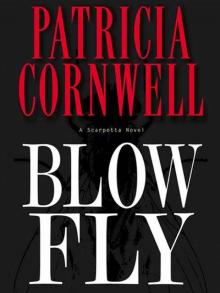 Blow Fly
Blow Fly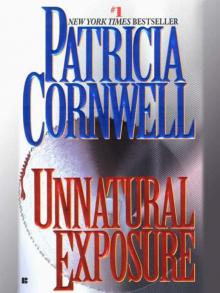 Unnatural Exposure
Unnatural Exposure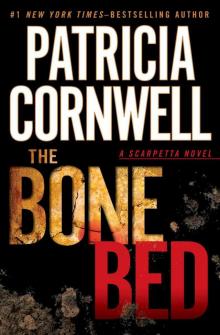 The Bone Bed
The Bone Bed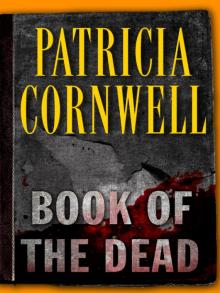 Book of the Dead
Book of the Dead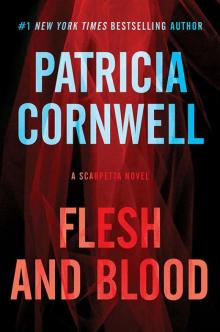 Flesh and Blood: A Scarpetta Novel (Scarpetta Novels Book 22)
Flesh and Blood: A Scarpetta Novel (Scarpetta Novels Book 22)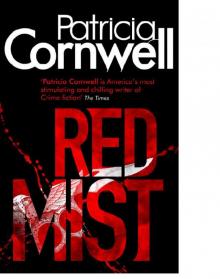 Red Mist
Red Mist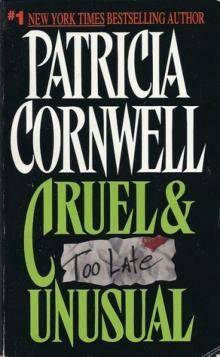 Cruel & Unusual
Cruel & Unusual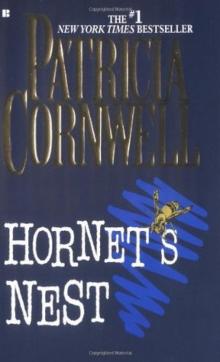 Hornet's Nest
Hornet's Nest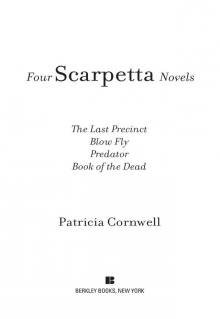 Four Scarpetta Novels
Four Scarpetta Novels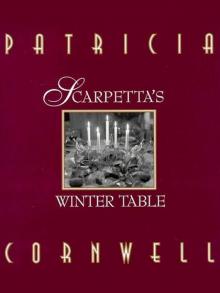 Scarpetta's Winter Table
Scarpetta's Winter Table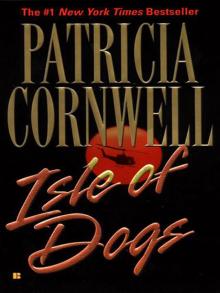 Isle of Dogs
Isle of Dogs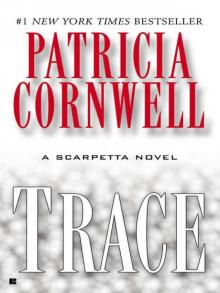 Trace
Trace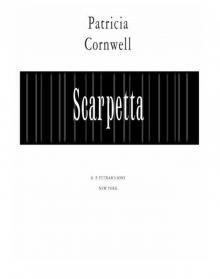 Postmortem
Postmortem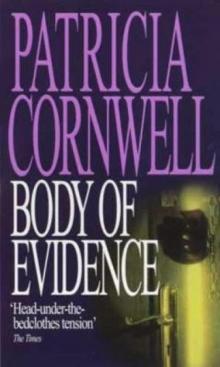 Body of Evidence ks-2
Body of Evidence ks-2 Southern Cross
Southern Cross All That Remains
All That Remains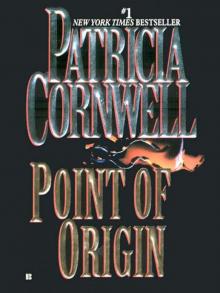 Point of Origin
Point of Origin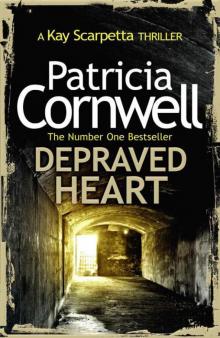 Depraved Heart
Depraved Heart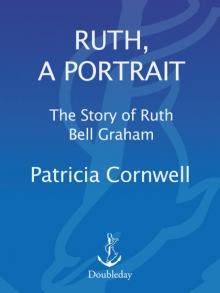 Ruth, a Portrait: The Story of Ruth Bell Graham
Ruth, a Portrait: The Story of Ruth Bell Graham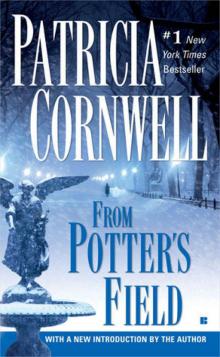 From Potter's Field
From Potter's Field Flesh and Blood
Flesh and Blood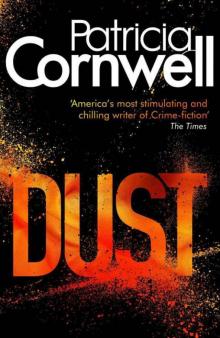 Dust
Dust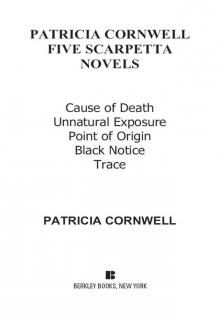 The Body Farm
The Body Farm Port Mortuary
Port Mortuary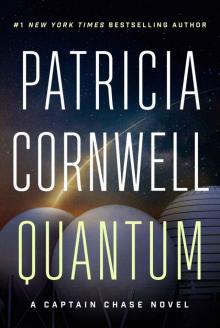 Quantum
Quantum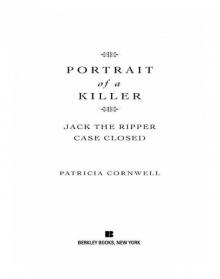 Portrait of a Killer: Jack the Ripper - Case Closed
Portrait of a Killer: Jack the Ripper - Case Closed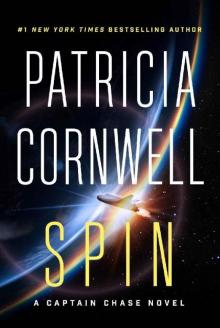 Spin (Captain Chase)
Spin (Captain Chase)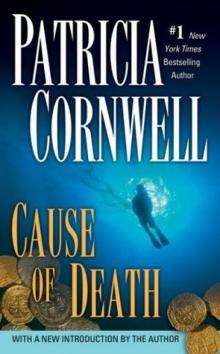 Cause of Death
Cause of Death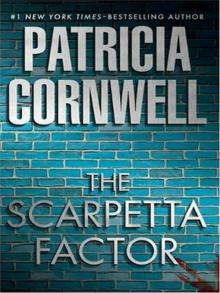 The Scarpetta Factor
The Scarpetta Factor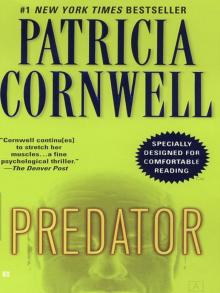 Predator
Predator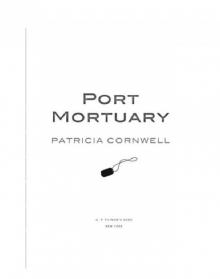 Scarpetta 18 - Port Mortuary
Scarpetta 18 - Port Mortuary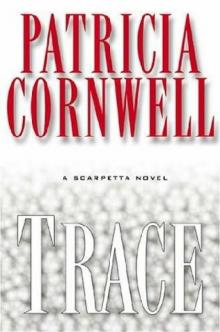 Trace ks-13
Trace ks-13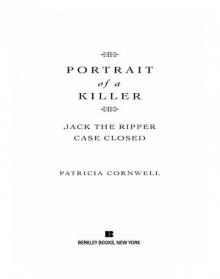 Portrait of a Killer
Portrait of a Killer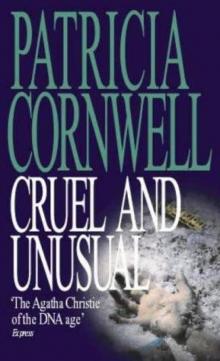 Cruel and Unusual ks-4
Cruel and Unusual ks-4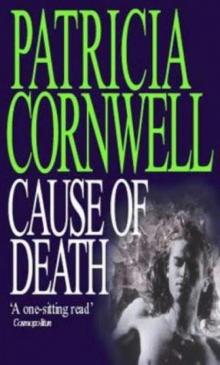 Cause Of Death ks-7
Cause Of Death ks-7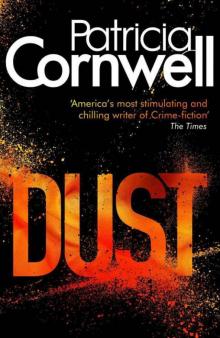 Dust ks-21
Dust ks-21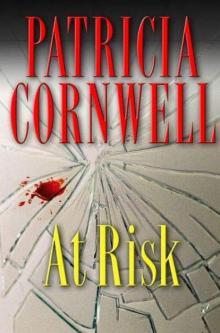 At Risk wg-1
At Risk wg-1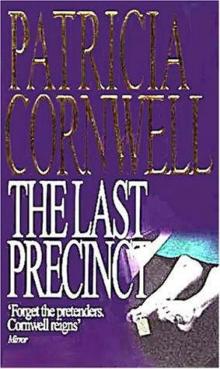 The Last Precinct ks-11
The Last Precinct ks-11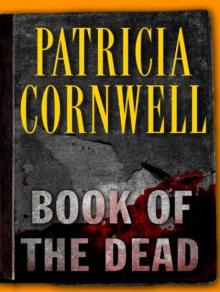 Book of the Dead ks-15
Book of the Dead ks-15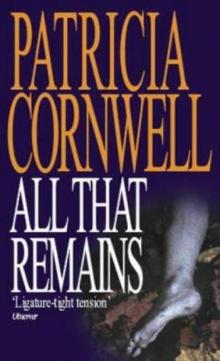 All That Remains ks-3
All That Remains ks-3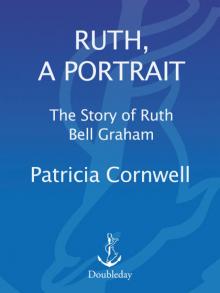 Ruth, a Portrait
Ruth, a Portrait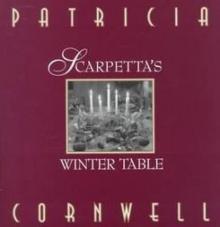 Scarpetta's Winter Table (kay scarpetta)
Scarpetta's Winter Table (kay scarpetta)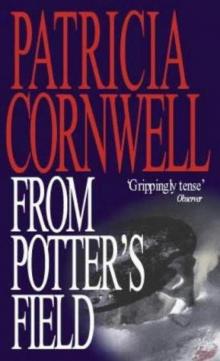 From Potter's Field ks-6
From Potter's Field ks-6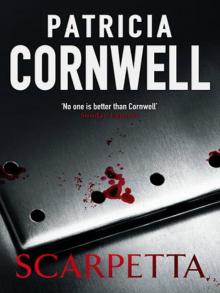 Scarpetta
Scarpetta Isle of Dogs jhabavw-3
Isle of Dogs jhabavw-3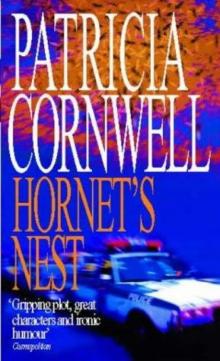 Hornet's Nest jhabavw-1
Hornet's Nest jhabavw-1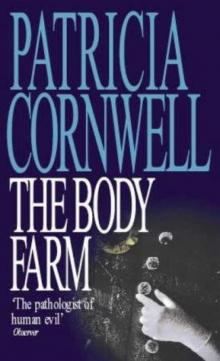 The Body Farm ks-5
The Body Farm ks-5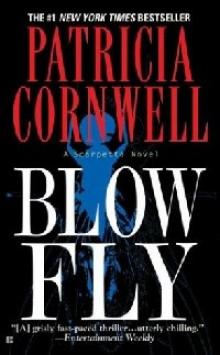 Blow Fly ks-12
Blow Fly ks-12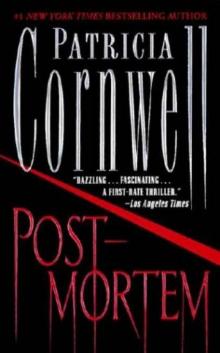 Post Mortem
Post Mortem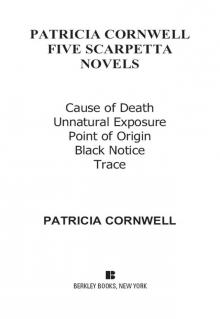 Five Scarpetta Novels
Five Scarpetta Novels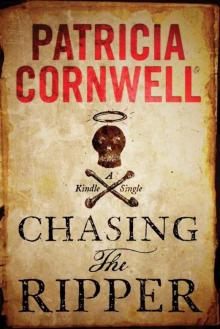 Chasing the Ripper (Kindle Single)
Chasing the Ripper (Kindle Single)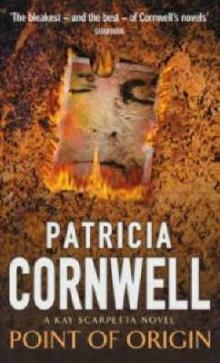 Point of Origin ks-9
Point of Origin ks-9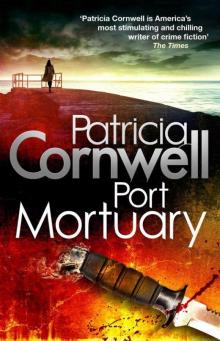 Port Mortuary (2010)
Port Mortuary (2010)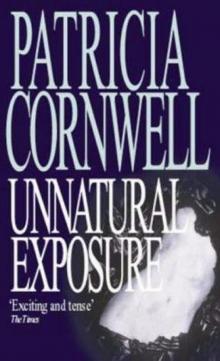 Unnatural Exposure ks-8
Unnatural Exposure ks-8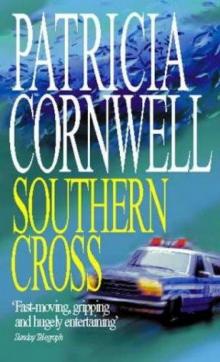 Southern Cross uhabavw-2
Southern Cross uhabavw-2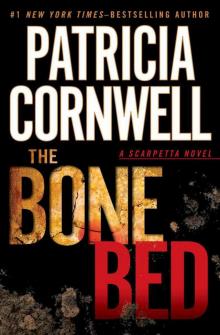 The Bone Bed ks-20
The Bone Bed ks-20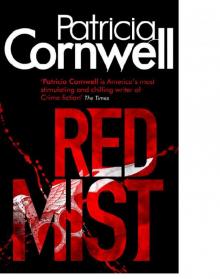 Red Mist ks-19
Red Mist ks-19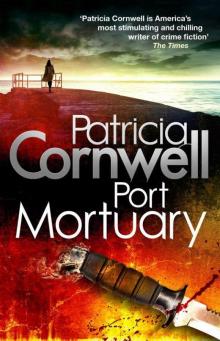 Port Mortuary (2010) ks-18
Port Mortuary (2010) ks-18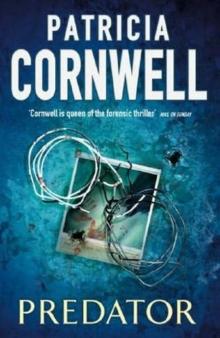 Predator ks-14
Predator ks-14